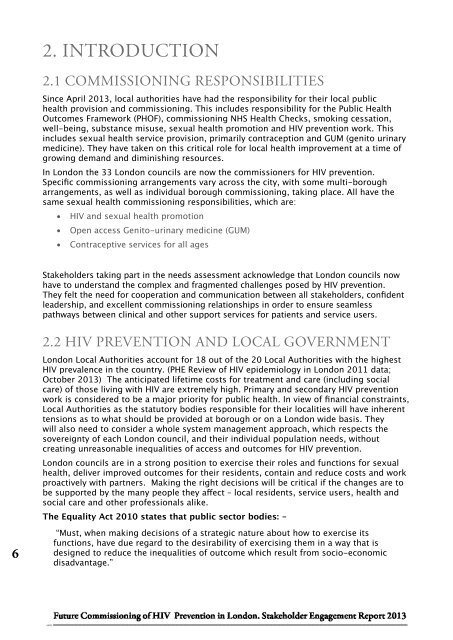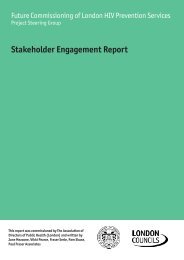Stakeholder Engagement Report - London Councils
Stakeholder Engagement Report - London Councils
Stakeholder Engagement Report - London Councils
You also want an ePaper? Increase the reach of your titles
YUMPU automatically turns print PDFs into web optimized ePapers that Google loves.
2. Introduction<br />
2.1 Commissioning responsibilities<br />
Since April 2013, local authorities have had the responsibility for their local public<br />
health provision and commissioning. This includes responsibility for the Public Health<br />
Outcomes Framework (PHOF), commissioning NHS Health Checks, smoking cessation,<br />
well-being, substance misuse, sexual health promotion and HIV prevention work. This<br />
includes sexual health service provision, primarily contraception and GUM (genito urinary<br />
medicine). They have taken on this critical role for local health improvement at a time of<br />
growing demand and diminishing resources.<br />
In <strong>London</strong> the 33 <strong>London</strong> councils are now the commissioners for HIV prevention.<br />
Specific commissioning arrangements vary across the city, with some multi-borough<br />
arrangements, as well as individual borough commissioning, taking place. All have the<br />
same sexual health commissioning responsibilities, which are:<br />
• HIV and sexual health promotion<br />
• Open access Genito-urinary medicine (GUM)<br />
• Contraceptive services for all ages<br />
<strong>Stakeholder</strong>s taking part in the needs assessment acknowledge that <strong>London</strong> councils now<br />
have to understand the complex and fragmented challenges posed by HIV prevention.<br />
They felt the need for cooperation and communication between all stakeholders, confident<br />
leadership, and excellent commissioning relationships in order to ensure seamless<br />
pathways between clinical and other support services for patients and service users.<br />
2.2 HIV prevention and local government<br />
<strong>London</strong> Local Authorities account for 18 out of the 20 Local Authorities with the highest<br />
HIV prevalence in the country. (PHE Review of HIV epidemiology in <strong>London</strong> 2011 data;<br />
October 2013) The anticipated lifetime costs for treatment and care (including social<br />
care) of those living with HIV are extremely high. Primary and secondary HIV prevention<br />
work is considered to be a major priority for public health. In view of financial constraints,<br />
Local Authorities as the statutory bodies responsible for their localities will have inherent<br />
tensions as to what should be provided at borough or on a <strong>London</strong> wide basis. They<br />
will also need to consider a whole system management approach, which respects the<br />
sovereignty of each <strong>London</strong> council, and their individual population needs, without<br />
creating unreasonable inequalities of access and outcomes for HIV prevention.<br />
<strong>London</strong> councils are in a strong position to exercise their roles and functions for sexual<br />
health, deliver improved outcomes for their residents, contain and reduce costs and work<br />
proactively with partners. Making the right decisions will be critical if the changes are to<br />
be supported by the many people they affect – local residents, service users, health and<br />
social care and other professionals alike.<br />
The Equality Act 2010 states that public sector bodies: -<br />
6<br />
“Must, when making decisions of a strategic nature about how to exercise its<br />
functions, have due regard to the desirability of exercising them in a way that is<br />
designed to reduce the inequalities of outcome which result from socio-economic<br />
disadvantage.”




